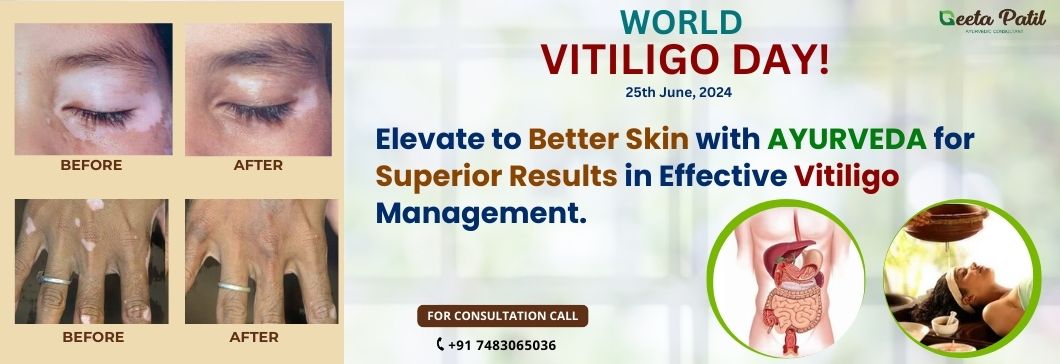Blog
How to Identify & Manage Vitiligo Through Ayurveda

Have you noticed unusual white patches on your skin that don't seem to go away?
This could be a sign of vitiligo, a condition that affects skin pigmentation. While not all white patches indicate vitiligo, this particular condition can impact various parts of your body and affect your confidence. Fortunately, Ayurveda offers a natural and holistic approach to managing and treating vitiligo. By understanding the root
causes and employing traditional healing methods, you can restore balance and promote healthy skin. I, Dr. Geeta Patil from Sanjeevani Ayurveda, will share insights into vitiligo and how Ayurveda can offer effective treatments.
Understanding Vitiligo
Vitiligo is a skin condition characterized by the loss of pigmentation, resulting in white patches on various parts of the body. This occurs when melanocytes, the cells responsible for producing melanin (the pigment that gives skin its color), are destroyed. Although vitiligo is not life-threatening or contagious, it can significantly impact an individual’s self-esteem and emotional well-being.
Symptoms of Vitiligo
Vitiligo typically manifests as:
White Patches on the Skin: These patches can appear anywhere but are more common on sun-exposed areas like the face, neck, hands, and feet.
Types of Vitiligo
Vitiligo can be classified into several types based on the pattern and location of the depigmentation:
- Generalized (Non-Segmental) Vitiligo:The most common type, where depigmented patches are distributed symmetrically across various parts of the body.
- Segmental Vitiligo: Occurs on one side of the body or in a specific area, often spreading more rapidly but more stable and limited than generalized vitiligo.
- Focal Vitiligo: Characterized by one or a few scattered white patches in a localized area.
- Acrofacial Vitiligo: Affects the face, hands, and feet, particularly around the eyes, nose, mouth, and fingers.
- Universal Vitiligo: A rare form where more than 80% of the skin loses its pigment.
Causes of Vitiligo
The exact cause of vitiligo is not fully understood, but several factors are believed to contribute to its development:
- Autoimmune Response: The body’s immune system mistakenly attacks and destroys melanocytes.
- Genetic Factors: A family history of vitiligo or other autoimmune conditions can increase the risk.
- Environmental Triggers: Exposure to certain chemicals, sunburn, or significant stress can trigger vitiligo in susceptible individuals.
- Neurogenic Factors: Interaction between the skin and nerve cells may contribute to the destruction of melanocytes.
Ayurvedic Perspective on Vitiligo
In Ayurveda, vitiligo is referred to as "Shvitra" or "Kilasa" and is considered to be caused by an imbalance in the body's doshas, particularly Pitta and Kapha. An imbalance in these doshas, along with the accumulation of toxins (ama) in the body, leads to the loss of skin pigmentation. Ayurvedic treatment focuses on restoring balance to the doshas and eliminating toxins to support skin health.
Ayurvedic Treatments for Vitiligo
Ayurveda offers a comprehensive approach to managing vitiligo through dietary changes, herbal remedies, lifestyle modifications, and purification therapies:
Dietary Changes
Ayurveda emphasizes the importance of a balanced diet to manage vitiligo:
Avoid Foods That Aggravate Pitta: Spicy, sour, and acidic foods should be avoided.
Incorporate Cooling Foods
Consume Foods Rich in Antioxidants: Fresh fruits and vegetables can help in reducing oxidative stress on the skin.
Avoid Non-Vegetarian Food and Fermented Items: These can aggravate the symptoms of vitiligo.
Herbal Remedies
Ayurveda utilizes various herbs known for their skin-healing properties:
Bakuchi (Psoralea corylifolia): This herb is known for its ability to stimulate melanin production. It can be applied topically or taken orally.
Neem (Azadirachta indica): Neem has powerful antimicrobial and immune-boosting properties that help in managing vitiligo.
Ayurvedic Purification Therapy
Purification therapies, known as Panchakarma, are effective in treating vitiligo by detoxifying the body and restoring balance to the doshas:
Virechana (Therapeutic Purgation): This procedure helps in eliminating toxins from the body and balancing Pitta dosha.
Basti (Medicated Enema): Basti therapy helps in detoxifying the colon and improving overall health, which can support skin healing.
Raktamokshana (Bloodletting): This therapy helps in purifying the blood and is beneficial for skin disorders like vitiligo.
Lifestyle Modifications
Certain lifestyle changes can help manage vitiligo more effectively:
Sun Protection: Protect your skin from excessive sun exposure by using natural sunscreens or wearing protective clothing.
Stress Management:Incorporate stress-reducing practices like yoga, meditation, and deep breathing exercises.
Avoid Exposure to Chemicals: Stay away from harsh chemicals and skin irritants that can trigger vitiligo.
World Vitiligo Day
World Vitiligo Day, observed on June 25th, aims to raise awareness about vitiligo and the challenges faced by those living with this condition. It is a day to promote understanding, share knowledge, and advocate for the rights of individuals with vitiligo. By recognizing this day, we can work towards reducing the stigma associated with vitiligo and support efforts to find effective treatments and a cure.
Conclusion:
Vitiligo can be a challenging condition, but with the holistic approach of Ayurveda, it is possible to manage the symptoms and improve the quality of life. By understanding the causes and incorporating Ayurvedic treatments, individuals can achieve better skin health and overall well-being. If you are experiencing symptoms of vitiligo or want to learn more about managing this condition, I am here to help. As Dr. Geeta Patil from Sanjeevani Ayurveda, I am committed to providing natural and effective solutions for your health concerns.
Wishing you a healthy and balanced life,
Dr. Geeta Patil
Sanjeevani Ayurveda

